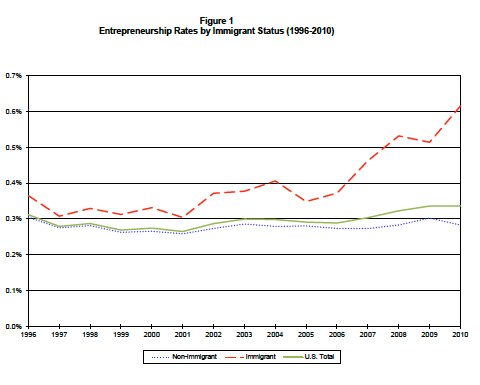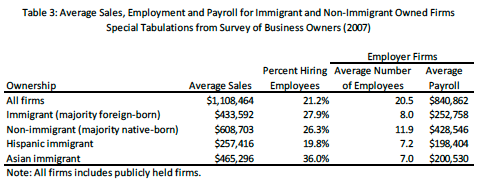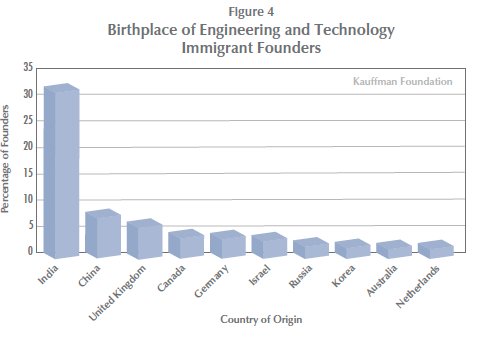One of the key economic arguments underpinning the immigration overhaul is that immigrants create jobs — not only because they spend money, but because they tend to be unusually entrepreneurial and innovative and so create job opportunities for the people around them. Think of Silicon Valley figures like Sergey Brin, Andrew Grove or Vinod Khosla — or the designer Liz Claiborne. The bill that passed the Senate last week, under Subtitle H, even included special provisions for what is being called a “start-up visa,” to be granted to people who start companies that meet certain venture capital, hiring and revenue requirements.
So is it true that immigrants are unusually entrepreneurial? The data available suggest that yes, immigrants are overrepresented among America’s business founders and innovators.
Immigration Divide
Weighing the economic claims in the Congressional debate.
According to a Small Business Administration-commissioned report in 2012 by Robert W. Fairlie, an economics professor at the University of California, Santa Cruz, the business ownership rate is higher for immigrants than the native-born, with 10.5 percent of the immigrant work force owning a business compared with 9.3 percent of the native-born work force.
Those numbers refer to ownership of existing businesses; immigrants are also more likely to start a business in any given month. In 2010, the business formation rate per month among immigrants was 0.62 percent, meaning that of every 100,000 non-business-owning immigrants, 620 started a business each month. The comparable rate for nonimmigrants was 0.28 percent (or 280 out of every of 100,000 non-business-owning adults). The gap in new business formation between immigrants and nonimmigrants has been growing recently, too.
 Robert W. Fairlie, “Immigrant Entrepreneurs and Small Business Owners, and Their Access to Financial Capital,” Small Business Administration Office of Advocacy, May 2012.
Robert W. Fairlie, “Immigrant Entrepreneurs and Small Business Owners, and Their Access to Financial Capital,” Small Business Administration Office of Advocacy, May 2012.
Higher business formation rates among the foreign-born may be driven by necessity, especially when the economy is bad.
“Because of limited job opportunities in the Great Recession there appears to be an even greater response of starting businesses among immigrants than among nonimmigrants, which may have to do with lower-skilled workers having more difficulty in finding jobs,” Mr. Fairlie writes.
Immigrant-owned businesses tend to be smaller, with an average of $435,000 in annual sales and receipts, compared with $609,000 for native-owned companies.
 Robert W. Fairlie, “Immigrant Entrepreneurs and Small Business Owners, and Their Access to Financial Capital,” Small Business Administration Office of Advocacy, May 2012.
Robert W. Fairlie, “Immigrant Entrepreneurs and Small Business Owners, and Their Access to Financial Capital,” Small Business Administration Office of Advocacy, May 2012.
As for job creation, companies owned by immigrants are slightly more likely to hire employees than are non-immigrant-owned companies, though they tend to take on fewer employees on average in the cases when they do hire. Among immigrant-owned businesses with employees, there are an average of eight employees and an average payroll totaling $253,000. Native-owned firms that have employees hire an average of 11.9 staff members, with an average payroll of $429,000.
The share of companies that export their goods and services is also higher for immigrant-owned than for native-owned businesses (7.1 percent versus 4.4 percent). This might be because immigrants have existing business networks within their home countries, but it’s hard to know from the data.
Immigrants’ entrepreneurship rates are especially high in the engineering and technology sector. About a quarter of engineering and technology companies founded between 2006 and 2012 had at least one founder who was born abroad, according to a 2012 Kauffman Foundation study. In Silicon Valley, the share was 43.9 percent.
Indian-born immigrants are most highly represented among entrepreneurs in the engineering and technology sector; of all immigrant-founded companies in the Kauffman Foundation study, a third had Indian founders, up from 7 percent in 2005. The next most common nation of origin for these high-tech immigrant entrepreneurs was China.
 “Then and Now: America’s New Immigrant Entrepreneurs, Part VI,” by Vivek Wadhwa, AnnaLee Saxenian and F. Daniel Siciliano. Kauffman Foundation, May 2012.
“Then and Now: America’s New Immigrant Entrepreneurs, Part VI,” by Vivek Wadhwa, AnnaLee Saxenian and F. Daniel Siciliano. Kauffman Foundation, May 2012.
Another Kauffman follow-up paper also found that these high-tech immigrant founders were highly educated (74 percent held graduate or postgraduate degrees), and a majority had originally come to the United States to study, not specifically to found a new company or to accept a job at an existing company.
A co-author of those papers, Vivek Wadhwa, has since written a book suggesting that we may be on the verge of a decline in high-tech immigrant entrepreneurship because of legal barriers to staying in the United States and improving economic opportunities back in immigrants’ home countries.
Aside from business start-up rates, another measurement that suggests immigrants are unusually innovative is the disproportionately high number of patents awarded to the foreign-born.
A 2007 Kauffman Foundation study found that foreign nationals residing in the United States were named as inventors or co-inventors on about a quarter of international patent applications filed from the United States in 2006. This figure probably understates immigrant patent filings, too, since it excludes immigrants who have already become naturalized citizens.
A subsequent study on immigrant patent filings (conducted by the Partnership for a New American Economy, a nonprofit group of which Mayor Michael R. Bloomberg is a co-founder) likewise found that immigrants were named in more than three out of four patents at America’s Top 10 research universities.
A version of this article appeared in print on 07/02/2013, on page A16 of the NewYork edition with the headline: Immigrants Rank Higher As Entrepreneurs.
Article source: http://economix.blogs.nytimes.com/2013/07/01/immigration-and-entrepreneurship/?partner=rss&emc=rss